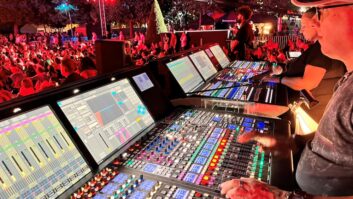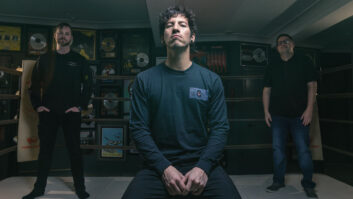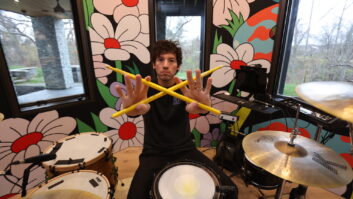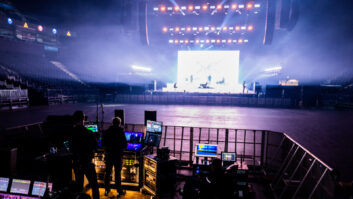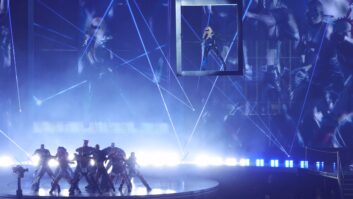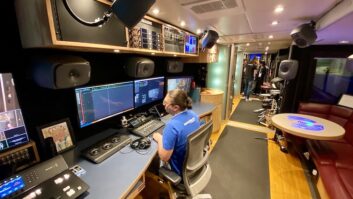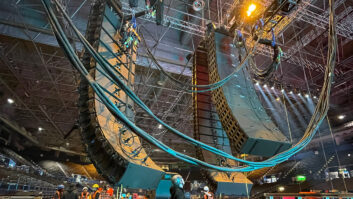This month, I mark my 20th anniversary as a professional audio writer. Okay, stop yawning. I know you don’t want to read another deadly “my life in audio” column by this (or any other) self-appointed sage about how much things have changed since I got started, or why the industry/the music/the gear/the drugs/life in general was so much better then, or how there were giants in those days and today there are only small frys toiling away on pointless projects in their little basement studios.
Besides being boring, most of those essays are simply not accurate. The gear today is much better, much cheaper and, for the most part, much easier to use. The audio industry is way bigger than it was then, and it is far more interesting, too. Twenty years ago, it seemed the only worthwhile jobs in the field were related to making music. Today there are dozens of other areas that are just as exciting for the aspiring audio professional. We have thrown open the doors of our little fraternity to a much broader section of the population, and I think that’s good.
No, I’m not going to lecture. I’m simply going to tell the story of how I got into this business. It has no moral, and it’s not exactly a boyhood-dream-come-true fable. (“Gee, Mom, when I grow up can I be a professional audio writer?” “Be quiet, son, and practice your bassoon.”) It’s more like a full-length demonstration of John Lennon’s aphorism, “Life is what happens to you when you’re busy making other plans.” Like many people, I am where I am today not by design, but by a combination of distraction, disappointment, serendipity and accident. But I don’t mind it at all-I doubt I would take the same route if I had the choice, but it’s nice to be here.
From a very early age, I had three passions: music, mechanical toys and words. I started reading at a ridiculously precocious age, and by the time I was in the third grade had consumed just about everything worthwhile in my school library, including a couple of encyclopedias. Early on, I figured out that if I could read, I could write, too. My first scribbles were short stories usually involving my friends, space rockets and large explosions.
Not much later, I discovered the power of the press to inform, inflame and enrage. When I was 8, I published a little family newsletter on my father’s duplicating machine (circulation: 6, if you counted my sister, who couldn’t read yet). By the time I was 13, I had gotten thrown off the staff of my junior high school newspaper for writing an editorial complaining that the student government elections were rigged, and for insubordination to the faculty jerk who supervised us. So I immediately started an “alternative” rag. Its mission was to insult everyone from the principal on down, and it almost got me suspended and nearly got the hapless English teacher we had convinced to sponsor us fired.
In high school, I continued this pattern-writing inflammatory articles for the student newspaper about politics and student rights, as well as music and pop culture-and learned about the realities of being a columnist: the rights (they have to publish you every issue, no matter what you come up with) and the responsibilities (you have to come up with something for every issue). One article, a satirical piece about student drug use that I wrote under a pseudonym, set off the largest scandal in the town’s history, thanks to hundreds of hand-wringing parents and teachers who took the piece completely seriously. In college, I wrote mostly breezy puff pieces about student goings-on and mostly nasty reviews of musical and theatrical events, until I got into a fistfight with the editor in the cafeteria over some obscure issue like censorship vs. editorial judgment.
After college, I found myself working as an engineer at a New York classical radio station, which put out a monthly program guide/magazine. The editor of the magazine, knowing my interest in contemporary music, asked if I would like to contribute reviews of new recordings of 20th-century repertoire. The first review I wrote was of an album on the avant-garde label CRI called Electronic Pioneers-works of early composers of electronic music, some of whom I had been studying with just a few years before. When I got an extra $25 in my paycheck that week, it was one of the few moments of real joy I experienced at a job that was otherwise pretty deadly. I continued to write for that magazine, even after I was let go from the station-they had finished building a new facility and didn’t really need me any more, and besides, I wasn’t very good at my job.
I was even on the cover of one issue of the station’s magazine. Every month they featured an arty shot of a faceless model playing one orchestral instrument or another. One month they were acutely embarrassed when they found out the model they had hired to “play” the harp had her hands entirely in the wrong place, so they wanted to make sure that mistake wasn’t repeated. The month I got fired, they wanted a bassoon on the cover. They knew I played that odd instrument and would know where to put my hands, so they asked me to sit for the cover-even though I had been sacked. It’s one of only two times in my life that I’ve worn a tuxedo, and I must say I looked great, even though you couldn’t see my face.
After I left New York and found myself unemployed in Boston, I approached the supplements editor of the Boston Phoenix- an alternative weekly known for its excellent arts coverage, incisive political writing and the raciest personal ads in the business-and was given several assignments to write about consumer audio, or what we called then “high fidelity.” It turned into a pretty regular gig, and I continued writing for the Phoenix for another half-dozen years, and sporadically even today.
But after about a year with the Phoenix, my journalism career took a holiday, when I got what sounded like the ultimate job offer. Since college, I had been trying to land a staff position at a recording studio. I had made some excellent contacts in New York and Boston, but received no bites. Suddenly, I had in my hand a letter from a brand-new, state-of-the-art 24-track MCI-equipped studio. Its owner asked me to come on as chief engineer. He would pay my travel expenses, find and pay for a place to live, and even give me a car. The studio was the first step in a planned corporate empire, which would include a film company, a publishing company and a record label. The only catch was (and I couldn’t figure this out until I looked closely at the stamps on the envelope) it was in Trinidad.
It was an offer I couldn’t refuse. I turned down a potentially lucrative theater gig (see next month’s column), and my brand-new girlfriend and I decided to seek our fortunes in the Third World.
I had never been outside North America before, and I had little idea what to expect. My new boss (an expatriate American who had married into a prominent local family) painted a rosy picture of the place, as would be expected. Therefore, I was unprepared for things like insane landladies, sporadic water supply, a phone system where the chances of a wrong number were something like 90%, and a work ethic based on two words: “Just Now.” That phrase could be interpreted just about any way you wanted: It could mean in a minute, in an hour, maybe later today, in a week if you’re lucky, or not during either of our lifetimes.
The studio was in a remote jungle location, in an abandoned World War II U.S. Navy tracking station, which the local government had essentially given to my boss’s company in some kind of nepotistic sweetheart deal. It was about three miles from the nearest public highway, and some ten miles from the city where we had our offices. Getting a telephone line to the studio involved stringing many miles of copper wire. We never did get a working phone into the place for more than a few hours, and I was constantly running into the office in town to make phone calls to book clients, order supplies and arrange for the repairs that were constantly needed in the tropical climate.
There was another reason for our telephone problems. Trinidad, at the time, was said to have the highest standard of living of the independent Caribbean nations, which unfortunately wasn’t saying much. Most of the island’s economy was centered around oil, which was under the control of American companies (agriculture in what should have been an extraordinarily fertile land had basically been left to go to hell). That meant plenty of pollution and an incredibly unequal distribution of wealth. Lots of really poor people living in wretched conditions.
As in many Central and South American countries, the single biggest event in Trinidadian society, the day that all Trinidadians rich and poor lived for, is Carnival: the celebration of the beginning of Lent, known in the States as Mardi Gras. There are fireworks, concerts, all-night bacchanals, battles of the steel pan bands (for which groups would practice for months in vacant lots turned into “pan yards”) and, above all, costumes: huge, gaudy, intricate, heavy constructions using yards and yards of cloth, tinsel, foil, paper and other eye-catching materials that make Liberace’s grandest excesses look like a pair of old boxer shorts.
What holds these remarkable materials together? Copper wire, of course. Can the people of Trinidad afford the cost of this wire? (A single costume can require 100 feet or more.) Of course not. So they go to the best free source they can find: telephone lines. And where better to snip large amounts of wire from poles without being caught, than a remote jungle road leading to an isolated gringo-owned building where nobody is likely to be around at night? No where-and that’s why our phones never worked.
But our communication problems extended beyond simply telephone lines. The night before Carnival, it rained, which was a fairly unusual event. What was more unusual was that early on Carnival morning, on a day I was supposed to have off, my boss appeared at my doorstep (the phones to my apartment building were, of course, out), and said, “We have a problem.”
We drove to the studio, I in somnolent silence and he cursing under his breath. When we got there, the control room had a full inch of water on the floor. We looked up at the ceiling, and there was a neatly cut three-foot hole where the tropical sun shone through. We climbed up on the roof, where a crew had been replacing the ancient tin with aluminum, and found the large, heavy blue tarp that was supposed to have been stretched over the hole when the crew went home. Instead of being in its proper place, it was stacked neatly off to the side.
We headed off in the car again, in search of the chief of the roofing crew. We found him at home, bleary-eyed from the traditional pre-Carnival dark-rum binge.
“Were you there when the shift ended yesterday?” we demanded.
“Ya, I should say so,” he replied.
“Well, why didn’t you cover the hole?”
He seemed puzzled by how we could ask such a dumb question. “Because it’s Carnival,” he finally said.
“What the #&^*! does Carnival have to do with it?” the boss screamed.
The poor man came out of his fog long enough to fix his gaze on the boss, as if addressing an ill-mannered but slow child. “Because, mon, Carnival is in the dry season!”
There were many other amazing stories that came out of my Trinidad experience, and when I finally escaped from there, I knew I had to tell them. But how, and to whom? People outside the recording industry wouldn’t understand most of them. So I decided to reach for an audience I knew would appreciate these tidbits. I contacted an English pro audio magazine that I had gotten to know in Trinidad, one that often ran industry horror stories under the heading “Agony.” I offered the editor two short anecdotes for the column, and the response came back: “More!”
And that, friends, is how in September 1979, I became a professional audio writer. I maintained a good relationship with that magazine for several years, not only telling my own stories, but the stories of many other engineers, producers, manufacturers and musicians, and I used it as a springboard to get into many more magazines such as Recording Engineer/Producer, High Fidelity, High Technology and even High Times. It also brought me to the attention of various equipment manufacturers in need of someone who might be able to write user manuals in something resembling English, and that’s how I got into documentation.
I never set out to be a writer-those were the people who sat in the front in my college English classes having heated debates with each other and the teacher (while I snored in the back or never showed up at all), and who went to places like Iowa for grad school. But I have managed to make a decent chunk of my living doing it for two decades. So I’m still playing with my childhood passions-music, mechanical toys, and words-but the way I balance them in my life is something I never would have thought up. I still have goals that I hope to attain someday-scoring a huge-budget Hollywood film, producing a hit record for Bruce Springsteen, conducting a major orchestra in Carnegie Hall-but I figure that whatever I do, writing will still be a part of my life. Because I like to tell people about stuff-I really do. And it sure beats working.
